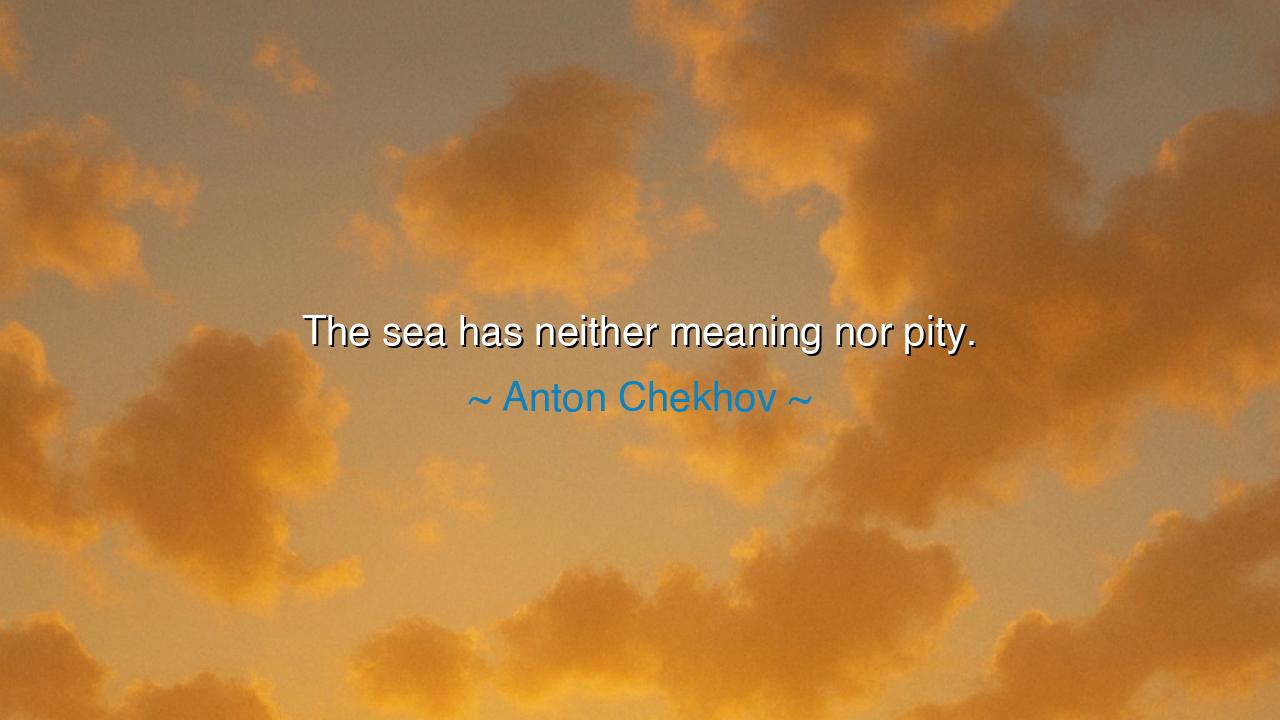
The sea has neither meaning nor pity.






Hearken, O children of the ages, to the stark meditation of Anton Chekhov, whose words pierce the heart like the salt wind upon the open waves: “The sea has neither meaning nor pity.” In these words lies a meditation upon the indifference of nature, the impartiality of the cosmos, and the smallness of human desire against the vastness of existence. Chekhov, the master of nuance and observation, reminds us that the world does not bend to our hopes, fears, or moral expectations; it is bound by its own laws, blind to the pleas and passions of mankind.
The sea, eternal and unyielding, symbolizes the great forces of life and nature. It is neither cruel nor benevolent; it simply is. Its storms destroy, its calm deceives, its depth conceals mysteries beyond human reckoning. In this, Chekhov teaches that the human longing for meaning, justice, or mercy in the face of the universe’s vast indifference must be tempered by humility. The waves do not answer to prayer; the tides care not for justice. To live wisely is to recognize the impartiality of existence and to act with courage and virtue despite it.
Consider the tragedy of the sailors of the Titanic, who faced the might of the Atlantic with unpreparedness and hubris. The sea offered no warning beyond its natural signs, no compassion for human error or ignorance. Lives were lost, dreams were shattered, yet the sea remained unchanged—neither malevolent nor sympathetic. Chekhov’s meditation resonates here: the indifference of nature demands that we cultivate foresight, skill, and resilience, for pity and moral reasoning are not forces that govern storms or currents.
The essence of this reflection lies in acceptance and preparation. To understand the sea is to understand that one must navigate it with care, respect, and knowledge. Likewise, life offers trials that are impartial and unforgiving. Misfortune, loss, and suffering are not punishments; they are natural consequences of the currents of existence. Human suffering gains depth and meaning only through the courage with which it is met, not through expectation of external mercy.
Even in daily life, Chekhov’s wisdom persists. The sea may be mirrored in the unpredictability of illness, economic misfortune, or societal upheaval. The human tendency to seek a cosmic arbiter or moral balancing in the universe often meets only silence. Yet, in acknowledging the impartiality of forces around us, we find the power to act deliberately, to cultivate resilience, and to support one another through the tempests that life casts upon our paths.
This meditation also teaches clarity of perspective. To view the world as neither inherently just nor cruel frees the mind from illusion. Chekhov’s sea is a mirror of life’s essential truth: meaning is not always given; it must be created, discovered, or embraced within oneself. Human courage, ingenuity, and compassion gain their fullest expression not because the world guarantees reward, but because they are chosen in defiance of indifference.
O children of wisdom, take this teaching to heart: recognize the impartiality of life’s forces, whether they be the vast sea or the unseen currents of fate. Prepare diligently, act courageously, and cultivate virtue not in expectation of reward or pity, but because these are the anchors that allow the human spirit to endure. In the indifference of nature, one finds the opportunity for true mastery of self and circumstance.
Thus, let the words of Anton Chekhov resonate through your hearts: the sea offers neither meaning nor pity, yet in facing it with wisdom, preparation, and courage, the human soul discovers its capacity for resilience, understanding, and greatness. Honor the impartiality of life, cultivate foresight, and let your actions rise like a steadfast ship upon the boundless waves of existence.
If you wish, I can also create a practical guide for navigating life’s indifference, inspired by Chekhov’s meditation, with exercises for cultivating resilience, perspective, and preparedness in daily living. Do you want me to do that?






AAdministratorAdministrator
Welcome, honored guests. Please leave a comment, we will respond soon